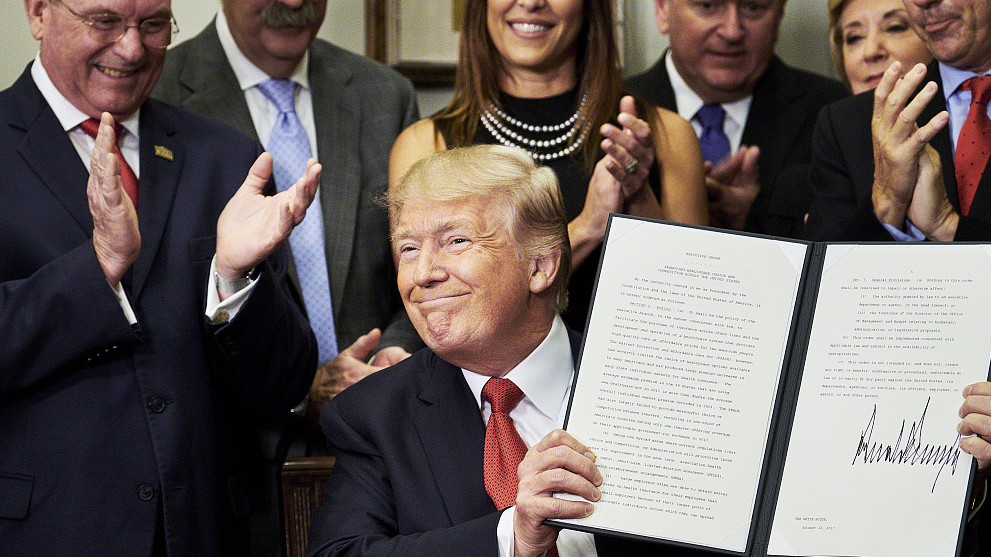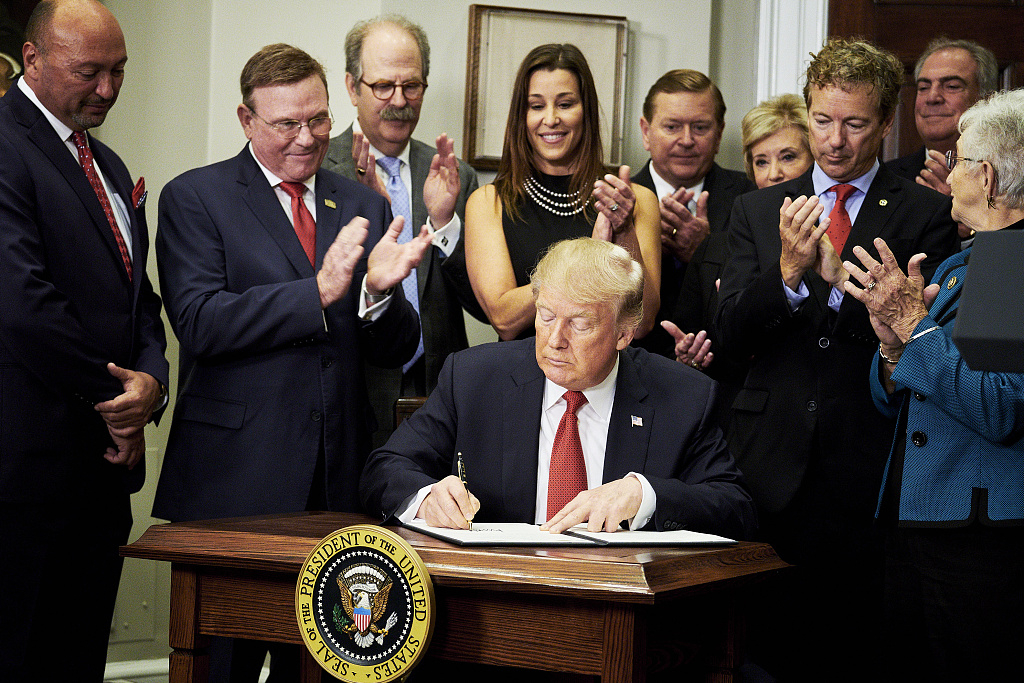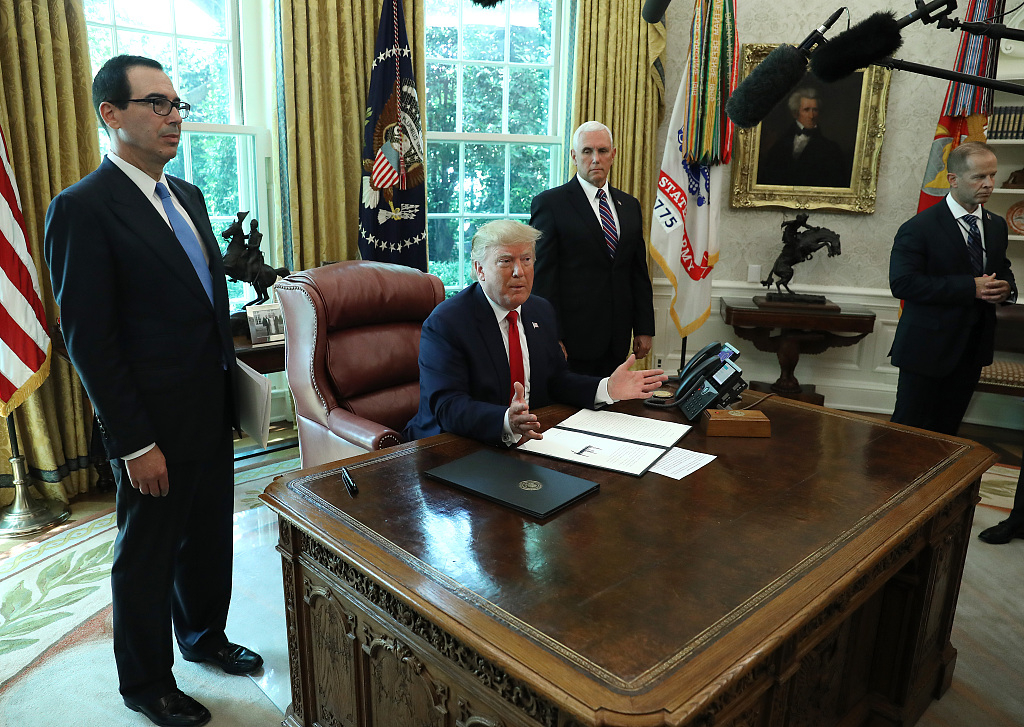

Editor's Note: Tom Fowdy is a British political and international relations analyst and a graduate of Durham and Oxford universities. He writes on topics pertaining to China, the DPRK, Britain, and the United States. The article reflects the author's opinions, and not necessarily those of CGTN.
In the aftermath of the controversy pertaining to comments by former British ambassador to the United States Sir Kim Darroch, new leaks surfaced in Britain's The Mail on Sunday whereby the official described Trump's withdrawal from Iran deal as an act of "diplomatic vandalism" and stated he done so only to spite his predecessor Barack Obama. The trickle of Darroch's private comments to the press has continued despite warnings that a legal investigation would be pursued by the foreign office against the perpetrator, given the enormous diplomatic ramifications of the leaks to the UK-U.S. relationship.
However, focusing on the content of the remarks themselves, is it accurate to say that Trump binned the Joint Comprehensive Plan of Action (JCPOA) simply because he didn't like Obama? While evidence shows that Trump has repeatedly criticized his predecessor, while also moving to dismantle his legacy in every single area, it isn't really explainable as a "personal" issue.
Instead, the disdain for the former president is rooted in the growing polarization of American politics and Republican contempt for the brand of liberalism which he advocated, a sentiment which emerged drastically under his presidency. With Obama being portrayed by the GOP as unpatriotic, the scramble to destroy his achievements has been far more entrenched than Trump as an individual.

U.S. President Donald Trump signs an executive order on health care in the Roosevelt Room of the White House in Washington, D.C., October 12, 2017. /VCG Photo
Where does contempt for Obama begin? Although it is a political sentiment which Trump has weaponized, it is one that pre-dated him and should be described as him having "latched" onto, than orchestrated singlehandedly. In 2008, Barack Obama's ascendency to the White House was heralded as a great turning point in American history. He was the African American to become President of the United States, and he announced a message of hope to the world.
In doing so, he aimed to be the most progressive President of modern times, seeking to challenge the "old guard" of white, fiscally conservative protestants, which dominated Washington for decades, as a new face of a cosmopolitan, liberal America. Obama's leadership drove forwards progress on issues such as LGBT rights, and progressive programs such as "Obamacare" sought to revolutionize healthcare in the U.S. In the normative sense, his presidency oversaw a drastic shift in the paradigm of American politics.
However, the impact of this incited a backlash amongst certain groups within American society, anxious that their racial privileges and thus "identity" was somehow under threat. As a result, Obama's presidency oversaw a polarization of American politics. Radical right movements such as "the tea party" sought to preserve the fading influence of evangelical Christianity and fiscal Conservatism in the U.S. Thus despite that Obama was a popular President as a whole, he became some kinds of apocalyptic hate figure amongst ideologically committed Conservatives.
In the midst of this, along came Trump. In 2012 the now-president sought to test the waters of racial sentiment against the president by weaponizing a conspiracy theory that Obama was not born in the U.S., a claim which was believed by up to 25 percent of American adults at its height. By trying out this theory, Trump discovered the racial anxieties underneath the surface about the Obama Presidency and what it was "transforming" America into.

U.S. President Donald Trump speaks as Vice President Mike Pence (R) and Treasury Secretary Steve Mnuchin (L) look on after the signing of an executive order imposing new sanctions on Iran in the Oval Office at the White House in Washington, D.C., June 24, 2019. /VCG Photo
In turn, this became the precursor of "Make America Great Again" – a campaign slogan and conceptualization built around the claim that America's identity and "purpose" in the world (i.e., inexplicitly the white protestant status quo) was under threat through weak leaders such as Obama, explaining a changing country and globalization through the prism of "selling out the country". Thus, Trump successfully played upon this polarization to create a new nationalistic, aggressive and populist politics.
On these grounds, the dumping of the Iran deal was not so much a personal issue with Obama, as it was the product of a grand narrative that the preceding president's diplomacy and policies that had created a sense of "national weakness" which gave far too much grounds to the perceived "enemies". For in such a polarized environment, many Republicans had truly grown to believe that Obama's legacy was contemptuous and needed to be reserved back to the "right way" as soon as possible.
So Trump's decision to withdraw from the deal was not so much a private endeavor with his predecessor, but a systemic influence exerted upon him which sought to reassert the traditional hardline "Republican way" as soon as possible, as well as of course reaffirming unconditional support for Israel. Thus, American politics must now be assessed in the light of extreme division and should a Democrat succeed Trump, there will likely be a similar push to eradicate as much of his legacy as reason will permit.
(If you want to contribute and have specific expertise, please contact us at opinions@cgtn.com.)

Copyright © 2018 CGTN. Beijing ICP prepared NO.16065310-3
Copyright © 2018 CGTN. Beijing ICP prepared NO.16065310-3